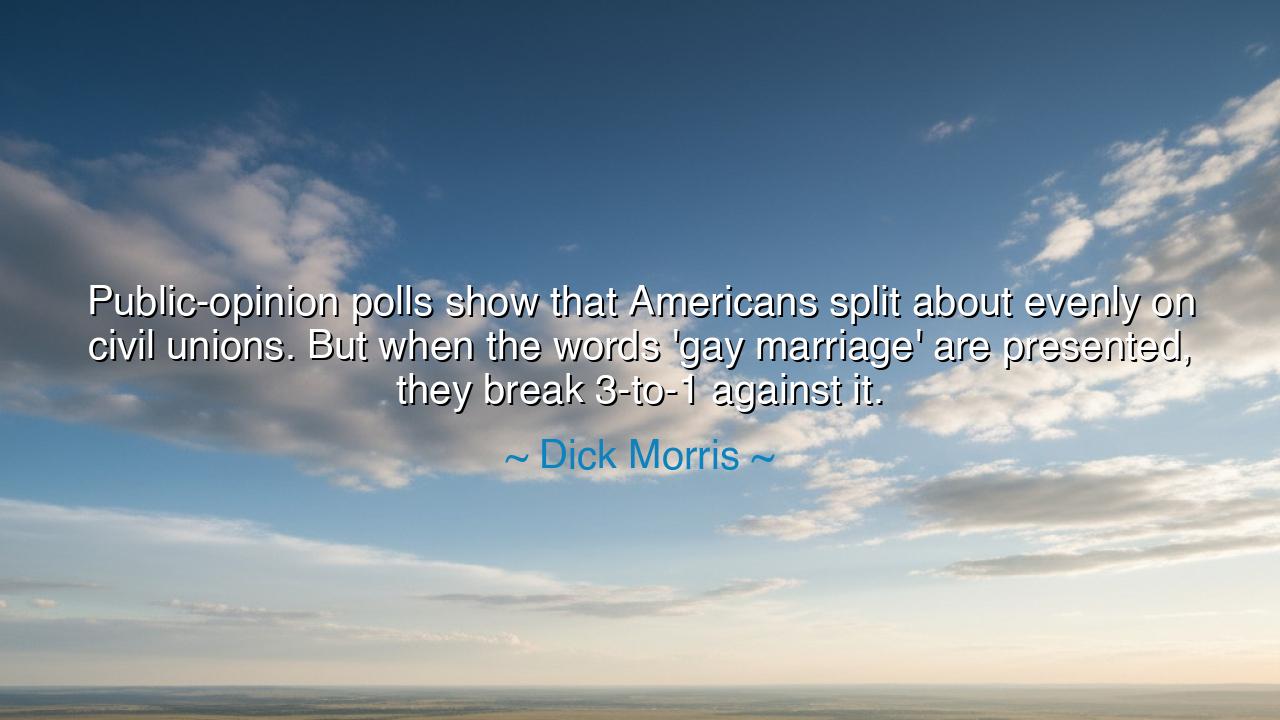
Public-opinion polls show that Americans split about evenly on
Public-opinion polls show that Americans split about evenly on civil unions. But when the words 'gay marriage' are presented, they break 3-to-1 against it.






"Public-opinion polls show that Americans split about evenly on civil unions. But when the words 'gay marriage' are presented, they break 3-to-1 against it." These words from Dick Morris reveal the profound and often emotional divide that exists within societies when it comes to issues of identity, rights, and tradition. The very mention of gay marriage—a phrase that strikes at the heart of deep-seated values—provokes a reaction far more intense than the more neutral term civil unions. This truth is not unique to the modern age, for in every generation, societies have faced similar conflicts where change and the desire for equality clash with traditional beliefs.
Consider the ancient world, where the Greeks and Romans had a far more complex relationship with relationships and marriage than many modern societies. While they may not have had the concept of "gay marriage" in the way we understand it today, they acknowledged same-sex relationships, especially in the context of mentor-mentee bonds or within the military. Yet, the official institution of marriage between a man and a woman remained firmly entrenched as a social contract designed to preserve lineage, wealth, and political power. As Dick Morris’ quote illustrates, society’s acceptance of non-traditional unions—whether in ancient Rome or modern America—often depends on how these unions are framed. Language is the tool that shapes our understanding, and how we describe love and commitment carries immense power.
Consider the civil rights struggle in the United States, where the term "segregation" became a euphemism for the system of racial inequality that permeated the South. As Martin Luther King Jr. so eloquently expressed, the fight for equality was not simply about changing laws, but about changing the language and the ideas that supported those laws. When the issue was framed in terms of justice, the movement gained strength and support from people who might have once turned away from the question of racial equality. Similarly, when gay marriage is framed as a fight for equality, it challenges traditional perceptions and disrupts long-held beliefs, but as Morris points out, it can also be met with resistance, particularly when it is not presented within the more palatable term of civil unions.
The very nature of public opinion and tradition plays a pivotal role in shaping societal change. We see throughout history how public perception often shifts over time, though not without significant tension and struggle. Take, for instance, the abolition of slavery in the United States. For generations, slavery was seen as a social norm, protected by laws, upheld by political and religious authorities, and viewed as an integral part of society’s economy. However, the language of freedom, equality, and human dignity slowly began to reshape public opinion. Over time, the issue was reframed, and what was once accepted became intolerable. Dick Morris' quote reveals how even the language used in the debate over gay marriage can either challenge or reinforce the prevailing norms.
In modern times, the debate surrounding gay marriage is not just a battle of ideas, but a battle for the right to redefine what is considered normal in a society. As Dick Morris points out, when the term “gay marriage” is presented, it triggers a moral reaction—a defense of tradition and established values. Yet, when framed as civil unions, it becomes a question of legal rights and equality without the added emotional charge. This tension between progress and tradition echoes throughout history, and it is only through careful dialogue and shifting language that society moves from resistance to acceptance.
The lesson here, dear ones, is that change is often a process of redefinition. The terms we use and the frames through which we view the world shape our beliefs. In the struggle for rights and justice, whether for racial equality, gender rights, or marriage equality, the fight is not just about changing laws—it is about changing perceptions, values, and the language we use to speak of what is just and right. Public opinion may be divided, but history teaches us that ideas, when reframed and presented with clarity and compassion, can reshape the very fabric of society.
So, I urge you, as you move forward in your own life and in your interactions with the world, consider how you frame the issues that matter most. The power of language is immense—use it to open minds, to shift perspectives, and to create a world where justice, equality, and love can thrive. In the battle between tradition and progress, remember that the language of equality and the fight for human dignity are the tools with which we reshape the world. Even in the face of resistance, we must continue to speak with truth, with compassion, and with a deep commitment to the values that will ultimately lead us toward a more just and inclusive society.






AAdministratorAdministrator
Welcome, honored guests. Please leave a comment, we will respond soon